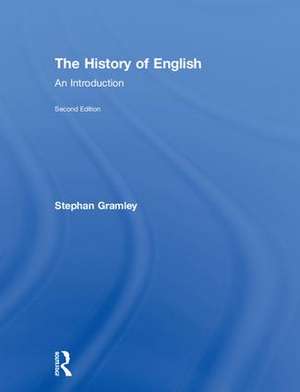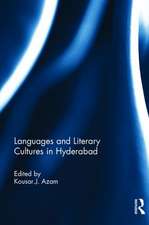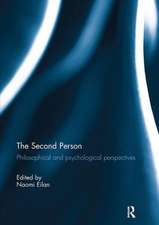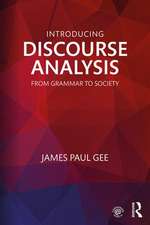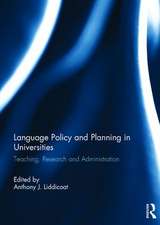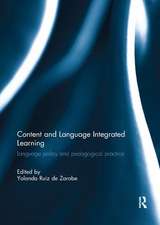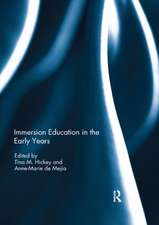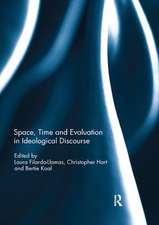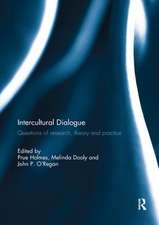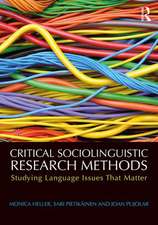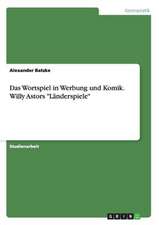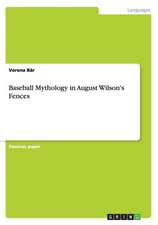The History of English: An Introduction
Autor Stephan Gramleyen Limba Engleză Hardback – noi 2018
The History of English goes beyond the usual focus on English in the UK and the USA to include the wider global course of the language during and following the Early Modern English period. This perspective therefore also includes a historical review of English in its pidgin and creole varieties and as a native and/or second language in the Caribbean, Africa, Asia, and Australasia.
This new edition of The History of English has been thoroughly revised and updated throughout, and features:
- chapter introductions and conclusions to assist in orientation;
- over 90 textual examples demonstrating linguistic change accompanied, as necessary, by translations and/or glosses;
- study questions on the social, cultural, and linguistic background of the periods and topics, as well as recommendations for further reading and topics for further study;
- over 100 figures, tables and maps to support and illuminate the text;
- 18 pages of colour plates depicting exemplary texts, relevant artifacts, and examples of language usage, including Germanic runes, the opening page of Beowulf, the New England Primer, and the Treaty of Waitangi;
- a brand-new companion website hosting further articles on linguistic, historical, and cultural phenomena which go beyond the scope of the book, additional sample texts, exercises, and audio clips.
| Toate formatele și edițiile | Preț | Express |
|---|---|---|
| Paperback (1) | 248.81 lei 6-8 săpt. | |
| Taylor & Francis – 16 noi 2018 | 248.81 lei 6-8 săpt. | |
| Hardback (1) | 779.71 lei 6-8 săpt. | |
| Taylor & Francis – noi 2018 | 779.71 lei 6-8 săpt. |
Preț: 779.71 lei
Preț vechi: 1036.52 lei
-25% Nou
Puncte Express: 1170
Preț estimativ în valută:
149.21€ • 162.03$ • 125.34£
149.21€ • 162.03$ • 125.34£
Carte tipărită la comandă
Livrare economică 22 aprilie-06 mai
Preluare comenzi: 021 569.72.76
Specificații
ISBN-13: 9781138501089
ISBN-10: 1138501085
Pagini: 506
Ilustrații: 143
Dimensiuni: 189 x 246 x 38 mm
Greutate: 1.32 kg
Ediția:2
Editura: Taylor & Francis
Colecția Routledge
Locul publicării:Oxford, United Kingdom
ISBN-10: 1138501085
Pagini: 506
Ilustrații: 143
Dimensiuni: 189 x 246 x 38 mm
Greutate: 1.32 kg
Ediția:2
Editura: Taylor & Francis
Colecția Routledge
Locul publicării:Oxford, United Kingdom
Public țintă
Postgraduate and UndergraduateCuprins
List of illustrations
List of texts
List of abbreviations
Preface to the first edition
Preface to the second edition
Acknowledgments
Part I Before Britain
Chapter 1 The origins of English (before 450)
Chapter overview
1.1 The origins of human language
1.2 Language change
1.3 Changes in Germanic before the invasions of Britain
1.4 The world of the Germanic peoples
1.5 The Germanic migrations
1.6 Summary
Study questions
Topic of interest for further study
Further reading
Part II Early English in Britain
Chapter 2 Old English: Early Germanic Britain (450-700)
Chapter overview
2.1 The first peoples
2.2 The Germanic incursions
2.3 Introduction to Old English
2.4 The Christianization of England
2.5 Literature in the early Old English period
2.6 Summary
Study questions
Topic of interest for further study
Further reading
Chapter 3 Old English: The Viking invasions and their consequences (700-1066/1100)
Chapter overview
3.1 The Viking invasions
3.2 Linguistic influence of Old Norse (ON)
3.3 Creolization3.4 Alfred’s reforms and the West Saxon standard
3.5 Monastic reform, linguistic developments, and literary genres
3.6 Summary
Study questions
Topic of interest for further study
Further reading
Chapter 4 Middle English: The non-standard period (1066/1100 - 1350)
Chapter overview
4.1 Dynastic conflict and the Norman Conquest
4.2 Linguistic features of Middle English in the non-standard period
4.3 French influence on Middle English and the question of creolization
4.4 English literature
4.5 Dialectal diversity in early ME
4.6 Summary
Study questions
Topic of interest for further study
Further reading
Chapter 5 Middle English: The emergence of Standard English (1350-1500)
Chapter overview
5.1. Political and social turmoil and demographic developments
5.2 The expansion of domains
5.3 Chancery English (Chancery Standard)
5.4 Literature in the late ME period
5.5 Variation in late ME
5.6 Summary
Study questions
Topic of interest for further study
Further reading
Chapter 6 Early Modern English period (1500-1700)
Chapter overview
6.1 The Early Modern English Period
6.2 Early Modern English
6.3 Regulation and codification
6.4 Religious and scientific prose and belles lettres
6.5 Variation: South and North
6.6 Summary
Study questions
Topic of interest for further study
Further reading
Part III Britain and beyond
Chapter 7 The spread of English (since the late sixteenth century)
Chapter overview
7.1 Social-historical background
7.2 European expansion and the slave trade
7.3 North America
7.4 The Southern Hemisphere
7.5 Second- and foreign-language countries (ESL and EFL)
7.6 Summary
Study questions
Topic of interest for further study
Further reading
Chapter 8 Standard and non-standard English (Modern English)
Chapter overview
8.1 Standard English and General English
8.2 English in England, Wales, Scotland – and Ireland
8.3 North American English
8.4 Southern Hemisphere English
8.5 Ethnicity and language
8.6 Summary
Study questions
Topic of interest for further study
Further reading
Chapter 9 English pidgins, English creoles, and English (since the early seventeenth century)
Chapter overview
9.1 Pidgins
9.2 Creoles
9.3 Pidgin and creole communities
9.4 Theories of origins
9.5 History and textual examples
9.6 Summary
Study questions
Topic of interest for further study
Further reading
Chapter 10 Grammatical change in Modern English
Chapter overview
10.1 Grammatical developments and word order
10.2 The noun phrase
10.3 The verb phrase: development of full ModE paradigm
10.4 Other: conjunctions and prepositions
10.5 Substrate influence
10.6 Summary
Study questions
Topic of interest for further study
Further reading
Chapter 11 Pronunciation change in Modern English
Chapter overview
11.1. Introduction and principles of pronunciation change
11.2 The reference accents and other national accents
11.3. Consonants in ModE
11.4 Vowels in ModE
11.5 Vowel changes in ModE: chain shifts and mergers
11.6 Summary
Study questions
Topic of interest for further study
Further reading
Chapter 12 Vocabulary and spelling change in Modern English
Chapter overview
12.1 New words and old
12.2 Borrowing
12.3 Word formation
12.4 Pragmatics
12.5 Modern English spelling
12.6 Summary
Study questions
Topic of interest for further study
Further reading
Part IV Worldwide English
Chapter 13 Global English (since 1945)
Chapter overview
13.1 The beginnings of Global English
13.2 Media dominance
13.3 Features of medialized language
13.4 English in a world-wide context
13.5 Bilingualism, code-switching, and hybrid languages
13.6 Summary
Study questions
Topic of interest for further study
Further reading
The International Phonetic Alphabet
Glossary
General Bibliography
Index
List of texts
List of abbreviations
Preface to the first edition
Preface to the second edition
Acknowledgments
Part I Before Britain
Chapter 1 The origins of English (before 450)
Chapter overview
1.1 The origins of human language
1.2 Language change
1.3 Changes in Germanic before the invasions of Britain
1.4 The world of the Germanic peoples
1.5 The Germanic migrations
1.6 Summary
Study questions
Topic of interest for further study
Further reading
Part II Early English in Britain
Chapter 2 Old English: Early Germanic Britain (450-700)
Chapter overview
2.1 The first peoples
2.2 The Germanic incursions
2.3 Introduction to Old English
2.4 The Christianization of England
2.5 Literature in the early Old English period
2.6 Summary
Study questions
Topic of interest for further study
Further reading
Chapter 3 Old English: The Viking invasions and their consequences (700-1066/1100)
Chapter overview
3.1 The Viking invasions
3.2 Linguistic influence of Old Norse (ON)
3.3 Creolization3.4 Alfred’s reforms and the West Saxon standard
3.5 Monastic reform, linguistic developments, and literary genres
3.6 Summary
Study questions
Topic of interest for further study
Further reading
Chapter 4 Middle English: The non-standard period (1066/1100 - 1350)
Chapter overview
4.1 Dynastic conflict and the Norman Conquest
4.2 Linguistic features of Middle English in the non-standard period
4.3 French influence on Middle English and the question of creolization
4.4 English literature
4.5 Dialectal diversity in early ME
4.6 Summary
Study questions
Topic of interest for further study
Further reading
Chapter 5 Middle English: The emergence of Standard English (1350-1500)
Chapter overview
5.1. Political and social turmoil and demographic developments
5.2 The expansion of domains
5.3 Chancery English (Chancery Standard)
5.4 Literature in the late ME period
5.5 Variation in late ME
5.6 Summary
Study questions
Topic of interest for further study
Further reading
Chapter 6 Early Modern English period (1500-1700)
Chapter overview
6.1 The Early Modern English Period
6.2 Early Modern English
6.3 Regulation and codification
6.4 Religious and scientific prose and belles lettres
6.5 Variation: South and North
6.6 Summary
Study questions
Topic of interest for further study
Further reading
Part III Britain and beyond
Chapter 7 The spread of English (since the late sixteenth century)
Chapter overview
7.1 Social-historical background
7.2 European expansion and the slave trade
7.3 North America
7.4 The Southern Hemisphere
7.5 Second- and foreign-language countries (ESL and EFL)
7.6 Summary
Study questions
Topic of interest for further study
Further reading
Chapter 8 Standard and non-standard English (Modern English)
Chapter overview
8.1 Standard English and General English
8.2 English in England, Wales, Scotland – and Ireland
8.3 North American English
8.4 Southern Hemisphere English
8.5 Ethnicity and language
8.6 Summary
Study questions
Topic of interest for further study
Further reading
Chapter 9 English pidgins, English creoles, and English (since the early seventeenth century)
Chapter overview
9.1 Pidgins
9.2 Creoles
9.3 Pidgin and creole communities
9.4 Theories of origins
9.5 History and textual examples
9.6 Summary
Study questions
Topic of interest for further study
Further reading
Chapter 10 Grammatical change in Modern English
Chapter overview
10.1 Grammatical developments and word order
10.2 The noun phrase
10.3 The verb phrase: development of full ModE paradigm
10.4 Other: conjunctions and prepositions
10.5 Substrate influence
10.6 Summary
Study questions
Topic of interest for further study
Further reading
Chapter 11 Pronunciation change in Modern English
Chapter overview
11.1. Introduction and principles of pronunciation change
11.2 The reference accents and other national accents
11.3. Consonants in ModE
11.4 Vowels in ModE
11.5 Vowel changes in ModE: chain shifts and mergers
11.6 Summary
Study questions
Topic of interest for further study
Further reading
Chapter 12 Vocabulary and spelling change in Modern English
Chapter overview
12.1 New words and old
12.2 Borrowing
12.3 Word formation
12.4 Pragmatics
12.5 Modern English spelling
12.6 Summary
Study questions
Topic of interest for further study
Further reading
Part IV Worldwide English
Chapter 13 Global English (since 1945)
Chapter overview
13.1 The beginnings of Global English
13.2 Media dominance
13.3 Features of medialized language
13.4 English in a world-wide context
13.5 Bilingualism, code-switching, and hybrid languages
13.6 Summary
Study questions
Topic of interest for further study
Further reading
The International Phonetic Alphabet
Glossary
General Bibliography
Index
Notă biografică
Stephan Gramley is Studiendirektor for the Department of Linguistic and Literary Studies at Bielefeld University, Germany.
Recenzii
"This updated edition contains a wealth of new material and is thus a veritable treasure trove documenting the history and development of the English language. With its global perspective, detailed textual analyses, accessible style and fascinating historical, linguistic and cultural contextualisation, it cannot fail to enthuse and motivate students of the English language and their teachers."
Catherine Watts, University of Brighton, UK
"Stephan Gramley’s book provides a valuable description of the linguistic and sociocultural factors that have influenced the development of English from its origins to its current versions around the world. The variety of examples and material provides students of various academic backgrounds an accessible and thorough source to understand both the development and current state of English."
William J. Crawford, Northern Arizona University, USA
Catherine Watts, University of Brighton, UK
"Stephan Gramley’s book provides a valuable description of the linguistic and sociocultural factors that have influenced the development of English from its origins to its current versions around the world. The variety of examples and material provides students of various academic backgrounds an accessible and thorough source to understand both the development and current state of English."
William J. Crawford, Northern Arizona University, USA
Descriere
The History of English: An Introduction provides a chronological analysis of the linguistic, social, and cultural development of the English language, from before its establishment in Britain around the year 450 to the present.
